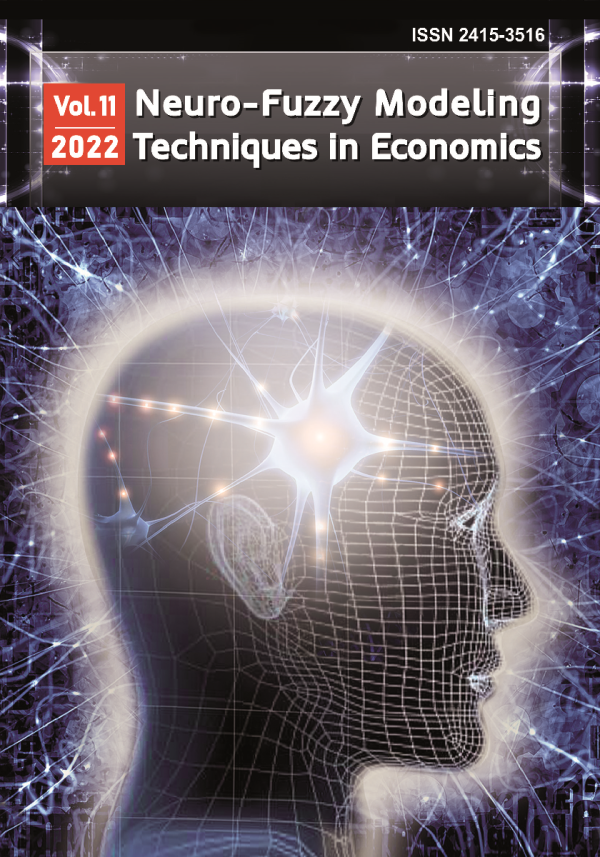
Neuro-Fuzzy Modeling Techniques in Economics
ISSN 2415-3516
Нейромережевий підхід до моделювання поведінки: аналіз результатів експерименту «суспільне благо»
Neural network approach to modeling behavior: the analysis of pg game outcomes
DOI:
10.33111/nfmte.2015.113
Анотація: Метою дослідження є нейромережеве моделювання типів поведінки людей на основі даних лабораторних експериментів «Суспільне благо» (PG game) та інтерпретація результатів з точки зору поведінкових гіпотез реципрокності та фрі-райдерства. Дослідження засноване на методах експериментальної економіки та кластеризації за допомогою карт Кохонена. Інформаційною базою моделювання є дані, отримані в результаті експериментів PG game в Україні. У статті розглянуто основні припущення моделі поведінки людини в економічній теорії та їх експериментальна перевірка; базова постановка експерименту «Суспільне благо» та огляд його результатів; кластеризація стратегій і виділення типів поведінки на основі даних експериментів PG, проведених в Україні, та інтерпретація результатів. Кластеризація дозволила виділити типи стратегій, які відрізняються вкладами та штрафами учасників: стратегії співробітництва, покарання та ухилення. Було показано, що стратегія співробітництва є, по-перше, найбільш поширеною, по-друге, найбільш стійкою. Виділено типи поведінки, які характеризуються зміною стратегії учасників. Тип поведінки, заснований на сполученні стратегій співробітництва та покарання, характеризує реакцію орієнтованих на співпрацю агентів, розчарованих фрі-райдерскою поведінкою партнерів. Тип поведінки, що поєднує стратегії співробітництва та ухилення, демонструє вплив покарання на поведінку учасників, схильних до ухилення від співробітництва (фрі-райдерства). Порівняльний аналіз результатів кластеризації стратегій та агентів дозволив провести більш тонку структуризацію учасників за поведінковими властивостями. Результати аналізу підтверджують гіпотези реципрокності та позитивного впливу покарання на співпрацю, що узгоджується з висновками зарубіжних досліджень.
Abstract: The aim of the research is neural network modeling of human behavior types on the basis of laboratory experiments «Public good» (PG game) outcomes, and interpretation of the results in terms of ‘reciprocity’ and ‘free-rider’ behavioral hypotheses. The study is based on the experimental economics methods and clustering using Kohonen maps. The information base of the model is the data obtained at PG games in Ukraine. The article contains: 1) the assumptions of the human behavior model in economic theory and their experimental verification; 2) the design of PG game and the review of its results; 3) clustering of the behavior strategies, modeling of behavior types on the basis of PG game outcomes held in Ukraine, and the interpretation of the results. Clustering of the outcomes has allowed us to identify the types of strategies that were different by participants’ contributions and fines: the strategies of cooperation, punishment and avoidance. It has been shown that the cooperation strategy is the most common, and the most stable. Also the behavior types that were characterized by changes in the participants’ strategies have been detected. The behavior type, which is based on a combination of cooperation and punishment strategies, characterizes the response of agents focused on the cooperation and disappointed by partners’ behavior. The behavior type, that combines cooperation and avoidance strategies, demonstrates the punishment effect on the free-rider behavior.
Comparative analysis of outcomes and agents clustering has allowed conducting more detailed structuring of the participants by the behavioral characteristics. The results of the analysis are the arguments for the hypothesis of reciprocity and the positive impact of punishment on cooperation; they are agreed with the findings of foreign studies.
Ключові слова: Стратегія поведінки, реципрокність, фрі-райдерство, експеримент «Суспільне благо», кластеризація, мережа Кохонена.
Key words: Experiment «Public good», behavior strategy, reciprocity, free-rider behavior, clustering, Kohonen neural network.
УДК: 330.4:519.25
UDC: 330.4:519.25
JEL: 41 45
To cite paper
In APA style
Merkulova, T., & Kononova, K. (2015). Neural network approach to modeling behavior: the analysis of pg game outcomes. Neuro-Fuzzy Modeling Techniques in Economics, 4, 113-134. http://doi.org/10.33111/nfmte.2015.113
In MON style
Меркулова Т.В., Кононова К. Нейромережевий підхід до моделювання поведінки: аналіз результатів експерименту «суспільне благо». Нейро-нечіткі технології моделювання в економіці. 2015. № 4. С. 113-134. http://doi.org/10.33111/nfmte.2015.113 (дата звернення: 09.01.2026).
With transliteration
Merkulova, T., Kononova, K. (2015) Neiromerezhevyi pidkhid do modeliuvannia povedinky: analiz rezultativ eksperymentu «suspilne blaho» [Neural network approach to modeling behavior: the analysis of pg game outcomes]. Neuro-Fuzzy Modeling Techniques in Economics, no. 4. pp. 113-134. http://doi.org/10.33111/nfmte.2015.113 [in Ukrainian] (accessed 09 Jan 2026).
 # 4 / 2015
# 4 / 2015
Download Paper

498
Views
151
Downloads
0
Cited by

